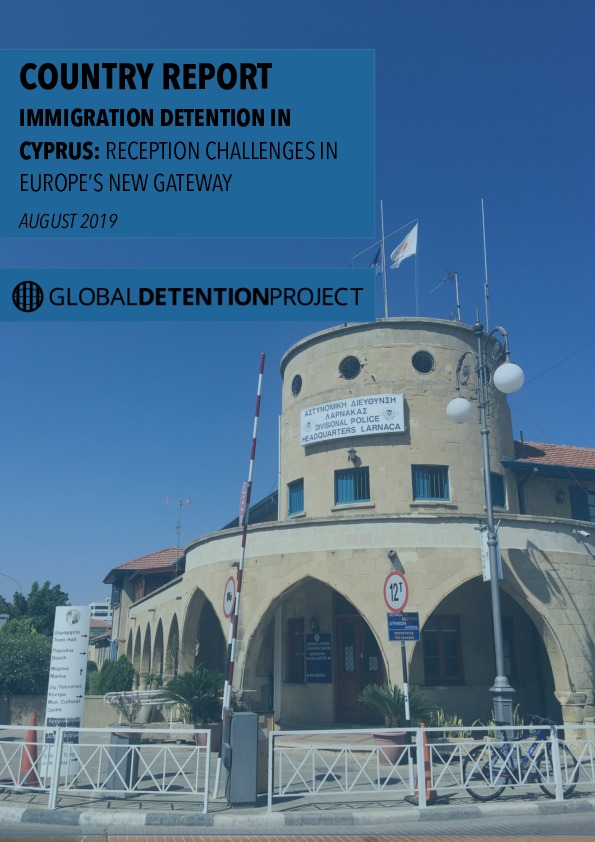Immigration Detention in Cyprus (2019 Report): Although the Republic of Cyprus is one of only a small number of EU member states that have yet to join the Schengen visa-free zone, the country is quickly becoming an important gateway for migrants and refugees as other routes into the EU have been blocked. With a small population of less than a million inhabitants, the country now has the highest number of asylum applications per capita in the region. The situation is leading to increasing tensions with Turkish-administered Northern Cyprus, concerns about a reception “crisis,” and the application of detention measures in asylum cases. Read the Cyprus Immigration Detention Profile.

________
Introduction to the 2019 Report
Although the Republic of Cyprus is one of only a small number of EU member states that have yet to join the Schengen visa-free zone, the country is quickly becoming an important gateway for migrants and refugees as other routes into the EU have been blocked. With a small population of less than a million inhabitants, the country now has the highest number of asylum applications per capita in the region. As the number of new asylum applications has dropped to pre-2015 levels in most of the EU, Cyprus has witnessed significant increases, from 2,940 applications in 2016 to 7,765 in 2018.
UNHCR has expressed concern that the rising numbers of arrivals may lead to a reception crisis in Cyprus. There are increasing numbers of people living rough on the streets, without access to shelter and food. With the country’s only reception centre—located in Kofinou (of capacity of 350)—stretched beyond capacity, the government announced plans in mid-2019 to set up two additional centres. The country also said that it would establish a “transit zone” at its border with Turkey (like at international airports) where asylum applications would be swiftly processed and access denied to those who do not qualify for asylum.
These growing challenges spurred Cyprus to ask the EU to relocate 5,000 asylum seekers in August 2019, in addition to its efforts to establish ad-hoc voluntary relocation schemes with other countries, which have met with little success. In its request for relocation, the Cypriot Interior Ministry stressed that the country is making efforts “to protect its EU border and curtail migration” and reduce “migratory influx.” The number of people denied entry to Cyprus increased fourfold between 2016 and 2018, from 565 in 2016, to 1,425 in 2017, and 2,025 in 2018.
The situation has also led to growing tensions between Cyprus and Turkey. Nearly half of arriving asylum seekers cross the “green line” separating the Republic of Cyprus from Turkish-administered Northern Cyprus, which is patrolled by the UN Peacekeeping Force in Cyprus (UNFICYP). Ankara does not enforce the so-called EU-Turkey deal, which addresses refugees and migrants arriving to Greek Aegean Islands, with respect to Cyprus. Cyprus has accused Turkey of not only tolerating people crossing the border but also of having a policy of “institutionalized” smuggling.
As a matter of policy, Cyprus grants Syrians—who account for nearly a quarter of asylum applicants—subsidiary protection rather than refugee status. This does not entitle them to family reunification and leaves many family members resorting to smugglers and attempting to reach the island by boat. According to UNHCR, 2018 saw a significant increase in such arrivals—while there were nine cases of boats arriving in 2017, more than 30 arrived in 2018. Cyprus has also resorted to using detention in many asylum cases. Aside from Syrians, people intending to apply for asylum can be detained for irregular entry or stay.
Like in Malta, Cyprus has not removed all vestiges of British colonial law from its immigration legislation and still provides for a category of “prohibited immigrant.” While the country transposed the Returns Directive in 2011, with its maximum length of detention and procedural safeguards, some antiquated colonial-era legal provisions have not been amended. Consequently, depending on the article under which detention is ordered, migrants and asylum seekers in Cyprus can still be subjected to indefinite detention, weak procedural safeguards, and lack of access to legal aid.



